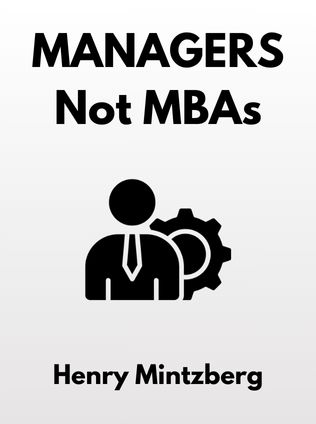
Managers Not MBAs
A Hard Look at the Soft Practice of Managing and Management Development
By Henry Mintzberg
Published 06/2005
About the Author
Henry Mintzberg is a renowned scholar in the field of management and organizational studies. Born in Montreal, Canada, Mintzberg has spent a significant part of his career at McGill University, where he holds the Cleghorn Professor of Management Studies chair. Known for his critical stance on traditional management education, Mintzberg has authored numerous influential books and articles. His works challenge conventional thinking in management and advocate for a more practical, experience-based approach to developing managerial skills. Mintzberg has received numerous awards, including the George R. Terry Award from the Academy of Management for his book The Rise and Fall of Strategic Planning, highlighting his impact on the field.
Main Idea
In Managers Not MBAs, Mintzberg critiques the existing MBA system, arguing that it fails to produce effective managers and leaders. He believes that traditional MBA programs overly emphasize analytical and technical skills while neglecting the importance of practical experience and soft skills. Mintzberg proposes an alternative educational model—the International Masters in Practicing Management (IMPM)—which integrates reflective, analytical, worldly, collaborative, and action-oriented mindsets. This holistic approach aims to develop well-rounded managers capable of navigating complex organizational and societal landscapes, rather than simply producing analysts equipped with theoretical knowledge.
Table of Contents
- Introduction: The MBA Problem
- The Wrong People: Who Should Be Managers?
- The Wrong Training: How Management Is Misconceived
- The Wrong Consequences: The Fallout of Poor Management Education
- Developing Managers: The New Approach
- The International Masters in Practicing Management (IMPM)
- Conclusion: A Call for True Schools of Management
Introduction: The MBA Problem
The MBA program, established over a century ago, was designed to standardize and professionalize management education. However, Mintzberg argues that it has largely failed to produce competent managers. He criticizes the MBA's heavy reliance on analytical skills, which he claims are insufficient for the complex, nuanced nature of real-world management. According to Mintzberg, "management is not a science; it is a practice" that cannot be fully captured by theoretical knowledge alone.
He suggests that the typical MBA curriculum, with its focus on case studies and quantitative analysis, tends to attract individuals more interested in financial gain than in fostering genuine leadership and managerial skills. Mintzberg asserts that the traditional MBA education system is flawed because it "pretends to create managers out of people with no experience or expressed leadership," leading to a disconnect between theoretical knowledge and practical application.
The Wrong People: Who Should Be Managers?
Mintzberg argues that the current system selects the wrong candidates for management roles. The MBA programs tend to attract individuals who excel in analytical thinking but lack practical managerial experience and leadership qualities. He points out that effective management requires a blend of experience, interpersonal skills, and the ability to inspire and lead others—qualities that are not adequately assessed by standardized tests or academic achievements.
He emphasizes that leadership is not something that can be easily taught to those who have never managed others. Mintzberg quotes, "Leadership is a natural quality, and teaching it to someone who has never managed is like teaching psychology to someone who has never met another human being." This analogy underscores the importance of real-world experience in developing true managerial capabilities.
Furthermore, he critiques the selection process for MBA programs, which often prioritize candidates with strong test scores over those with significant practical experience. This leads to a cohort of students who may excel academically but lack the depth of understanding and empathy required for effective management. Mintzberg argues that the best managers are those who have a "zest for business"—a genuine passion for nurturing and developing others, rather than merely seeking personal success or financial rewards.
Sign up for FREE and get access to 1,400+ books summaries.
You May Also Like
The Subtle Art of Not Giving a F*ck
A Counterintuitive Approach to Living a Good Life
By Mark MansonRich Dad Poor Dad
What the Rich Teach Their Kids About Money - That the Poor and Middle Class Do Not!
By Robert T. KiyosakiHow To Win Friends and Influence People
The All-Time Classic Manual Of People Skills
By Dale CarnegieQuiet: The Power of Introverts
The Power of Introverts in a World That Can't Stop Talking
By Susan Cain



















